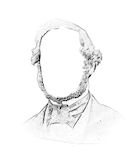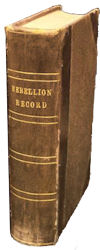
June 7th.—The Confederate issue of ten millions sterling, in bonds payable in twenty years, is not sufficient to meet the demands of Government; and the four millions of small Treasury notes, without interest, issued by Congress, are being rapidly absorbed. Whilst the Richmond papers demand an immediate movement on Washington, the journals of New York are clamoring for an advance upon Richmond. The planters are called upon to accept the Confederate bonds in payment of the cotton to be contributed by the States.
Extraordinary delusions prevail on both sides. The North believe that battalions of scalping Indian savages are actually stationed at Harper’s Ferry. One of the most important movements has been made by Major-General McClellan, who has marched a force into Western Virginia from Cincinnati, has occupied a portion of the line of the Baltimore and Ohio railway, which was threatened with destruction by the Secessionists; and has already advanced as far as Grafton. Gen. McDowell has been appointed to the command of the Federal forces in Virginia. Every day regiments are pouring down from the North to Washington. General Butler, who is in command at Fortress Monroe, has determined to employ negro fugitives, whom he has called “Contrabands,” in the works about the fort, feeding them, and charging the cost of their keep against the worth of their services; and Mr. Cameron, the Secretary of War, has ordered him to refrain from surrendering such slaves to their masters, whilst he is to permit no interference by his soldiers with the relations of persons held to service under the laws of the States in which they are in.
Mr. Jefferson Davis has arrived at Richmond. At sea the Federal steamers have captured a number of Southern vessels; and some small retaliations have been made by the Confederate privateers. The largest mass of the Confederate troops have assembled at a place called Manassas Junction, on the railway from Western Virginia to Alexandria.
The Northern papers are filled with an account of a battle at Philippi, and a great victory, in which no less than two of their men were wounded and two were reported missing as the whole casualties; but Napoleon scarcely expended so much ink over Austerlitz as is absorbed on this glory in the sensation headings of the New York papers.
After breakfast I accompanied a party of Mr. Burnside’s friends to visit the plantations of Governor Manning, close at hand. One plantation is as like another as two peas. We had the same paths through tasselling corn, high above our heads, or through wastes of rising sugar-cane; but the slave quarters on Governor Manning’s were larger, better built, and more comfortable-looking than any I have seen.
Mr. Bateman, the overseer, a dour strong man, with spectacles on nose, and a quid in his cheek, led us over the ground. As he saw my eye resting on a large knife in a leather case stuck in his belt, he thought it necessary to say, “I keep this to cut my way through the cane brakes about; they are so plaguey thick.”
All the surface water upon the estate is carried into a large open drain, with a reservoir in which the fans of a large wheel, driven by steam-power, are worked so as to throw the water over to a cut below the level of the plantation, which carries it into a bayou connected with the lower Mississippi.
In this drain one of my companions saw a prodigious frog, about the size of a tortoise, on which he pounced with alacrity; and on carrying his prize to land he was much congratulated by his friend. “What on earth will you do with the horrid reptile?” “Do with it! why, eat it to be sure.” And it is actually true, that on our return the monster ‘crapaud’ was handed over to the old cook, and presently appeared on the breakfast-table, looking very like an uncommonly fine spatch-cock, and was partaken of with enthusiasm by all the company.
From the draining-wheel we proceeded to visit the forest, where negroes were engaged in clearing the trees, turning up the soil between the stumps, which marked where the mighty sycamore, live oak, gumtrees, and pines had lately shaded the rich earth. In some places the Indian corn was already waving its head and tassels above the black gnarled roots; in other spots the trees, girdled by the axe, but not yet down, rose up from thick crops of maize; and still deeper in the wood negroes were guiding the ploughs, dragged with pain and difficulty by mules, three abreast, through the tangled roots and rigid earth, which will next year be fit for sowing. There were one hundred and twenty negroes at work; and these, with an adequate number of mules, will clear four hundred and fifty acres of land this year. “But it’s death on niggers and mules,” said Mr. Bateman. “We generally do it with Irish, as well as the hedging and ditching; but we can’t get them now, as they are all off to the wars.”
Although the profits of sugar are large, the cost of erecting the machinery, the consumption of wood in the boiler, and the scientific apparatus demand a far larger capital than is required by the cotton planter, who, when he has got land, may procure negroes on credit, and only requires food and clothing till he can realize the proceeds of their labor, and make a certain fortune. Cotton will keep where sugar spoils. The prices are far more variable in the latter, although it has a protective tariff of 20 per cent.
The whole of the half million of hogsheads of the sugar grown in the South is consumed in the United States, whereas most of the cotton is sent abroad; but in the event of a blockade the South can use its sugar ad nauseam, whilst the cotton is all but useless in consequence of the want of manufacturers in the South.
When I got back, Mr. Burnside was seated in his verandah, gazing with anxiety, but not with apprehension, on the marching columns of black clouds, which were lighted up from time to time by heavy flashes, and shaken by rolls of thunder. Day after day the planters have been looking for rain, tapping glasses, scrutinizing aneroids, consulting negro weather prophets, and now and then their expectations were excited by clouds moving down the river, only to be disappointed by their departure into space, or, worse than all, their favoring more distant plantations with a shower that brought gold to many a coffer. “Did you ever see such luck? Kenner has got it again! That’s the third shower Bringier has had in the last two days.”
But it was now the turn of all our friends to envy us a tremendous thunder-storm, with a heavy, even downfall of rain, which was sucked up by the thirsty earth almost as fast as it fell, and filled the lusty young corn with growing pains, imparting such vigor to the cane that we literally saw it sprouting up, and could mark the increase in height of the stems from hour to hour.
My good host is rather uneasy about his prospects this year, owing to the war; and no wonder. He reckoned on an income of £100,000 for his sugar alone; but if he cannot send it North it is impossible to estimate the diminution of his profits. I fancy, indeed, he more and more regrets that he embarked his capital in these great sugar-swamps, and that he would gladly now invest it at a loss in the old country, of which he is yet a subject; for he has never been naturalized in the United States. Nevertheless, he rejoices in the finest clarets, and in wines of fabulous price, which are tended by an old white-headed negro, who takes as much care of the fluid as if he was accustomed to drink it every day.








